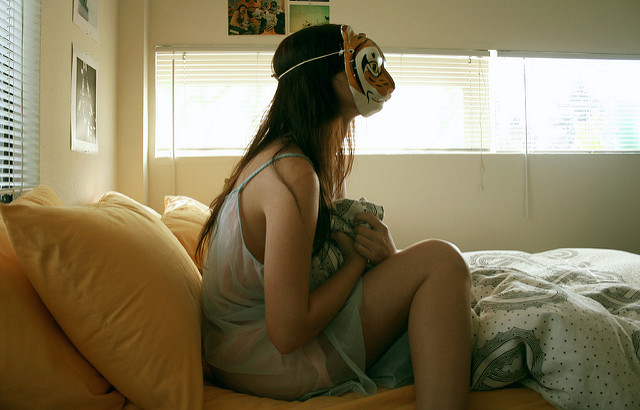“I’m not well.”
The words choked out from my throat. It took me weeks to get the courage to utter them; if I’m honest, years. “Just think positive” were the words spoken back to me. I felt the panic rise in my throat, the desire to run and hide—for being stupid, for asking for help. My chest closed off and tears pricked from my eyes as I whispered, “I’m trying.”
I felt even more like a failure. When I found the concepts of mindset and the subconscious, and the positive thinking world, I felt as though I had found a missing piece of a puzzle I didn’t know I was looking for—the concept that everything was my fault was novel, yet also felt like the truth.
What I didn’t realize was that the walls I had been hiding behind had started to crumble. My coping skills were no longer working to shut down how I felt.
I was exposed, raw, open and I had no idea what to do with that. There were days I didn’t get up, days I didn’t shower. I had gone from being a work-a-holic to barely functioning. I didn’t know what to do with all of this. I was overwhelmed.
I had no idea what feeling was like. I hadn’t felt it in a long time, maybe ever. I wasn’t prepared for how hard it was, for the emotional swings, how much everything would impact me without my walls, without my armor.
I was sure I had lost my mind. And I suppose for a time, I had.
I gave up everything I loved: exercise, eating healthy (eating at all), volunteering. I couldn’t be bothered. I was exhausted all the time. When I finally came to the point that the darkness threatened to engulf me forever, I reached out for help and was met with “think positive.”
I had been trying. That deepened my wound even more. I felt like a failure. And it hurt that I wasn’t able to say how I really felt to someone who I had been there for so many times.
A voice whispered inside of me, “It’s okay, ask someone else.” The next response I heard was, “Still? You’re still going through that?” I was crushed. I had not expected that response. I wanted to say, “I’m sorry my healing isn’t happening on your timeline,” but instead I choked back the words, as I had done my whole life.
The voice whispered, “Again, try again, you can’t stay here.”
And this time when I reached out a hand, one grasped mine back.
She held it while I poured my heart and soul, my hurts, and my traumas out of me—all the things I hadn’t been able to utter until now. She didn’t ask me to be somewhere I wasn’t. She didn’t say anything except that she was there for me. And she reminded me that I really had been through a lot and I had just started dealing with it. It was okay to be sad; to be angry at times because while I had been all of those things over the years, it was at the wrong things, at the superficial things. Now I was feeling it for the truth.
I instantly felt lighter, freer. It was the first step of many. Most of my life, I shrunk away from the truth, away from needing anyone, away from help, away from what I saw as weakness. In this moment, I was reminded that strength doesn’t come from hiding from the truth; it comes from standing in the truth and feeling it.
I learned a lot about discernment that year. Why did I go to people who I knew, deep down, wouldn’t understand where I was? I learned that positive thinking could be a Band-Aid just as much as eating, drinking, and other ways of numbing. We can hide behind positive thinking and pretend everything is fine. Everyone’s journey is not the same and when we have expectations of them and when we dull their light and interrupt their ability to heal, we are just asking them to be back in the box, to behave in a certain way, to be the “same.” There is no ideal model of healing a lifetime of hurts.
I also learned a valuable lesson. I “expected” to be more accepted, to be okay where I was. Each person can only see at the level they are, not necessarily where I was. That lesson allowed me to let go of the need to be something and somewhere I wasn’t. I realized as much as others had expectations of me, I had them too. I was looking for acceptance in people who could not accept me. Ultimately it helped me accept myself.
Just because someone talks the talk, doesn’t mean they walk the walk. When we learn discernment and trust our intuition, we see what, who, and where we need to be.
Instead of listening to others on how to think my way through it, I listened to my inner guidance. I knew I had to feel my way through it. And I did. I found the right people to work with, the ones who could hold me in the space of healing without judging me for where I was or how long it was taking me.
Once I let myself feel it, the healing happened so much faster than stuffing it down and pretending to be happy. I felt it all, the anger, the hurt, the confusion, the losses, the grief, the innocence, and loneliness. Eventually, I started to feel joy, happiness, and excitement. And it was no longer forced or fake. It was real.
When I let the wound bleed, it eventually stopped on its own. The pain turned to passion, the sadness to joy, and the darkness to light. I was authentically there.
I realized everything wasn’t my fault, but I did have a choice in how to respond. When positivity came, it came from my soul, not my head. It came from my heart when I allowed myself space, time and energy to fully heal.
I know people mean well when they say, “Just think positive,” but it’s not always that easy. Sure there are people who need to focus on positive things in their lives but when you have unhealed trauma and you’re trying to think positive, it’s like trying to hear a song on 101.7 FM while tuned into 97.5FM. It’s not possible.
Positive thinking is a beautiful life and I am now mostly—because I am also a human being who experiences other emotions—a happy healthy person naturally because I took the time to heal the wounds, to remove the triggers and design a new life based on who I am, not on who the world told me to be.
I prefer to call it “positive feeling” now because I have found when we give ourselves permission to feel what we are feeling, it moves on quickly and we bounce back to our natural state—happiness—without it being forced.
Positive thinking can be detrimental out of context. The first person you need to check in with is yourself. Find a quiet space, put your hand on your heart and ask yourself, “what do I need now?” Breathe and the answers will come.
Follow your own heart. It somehow always knows the truth.
Author: Tonya Whittle
Image: Hillary Boles/Flickr
Editor: Catherine Monkman
 Share on bsky
Share on bsky






Read 14 comments and reply